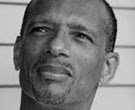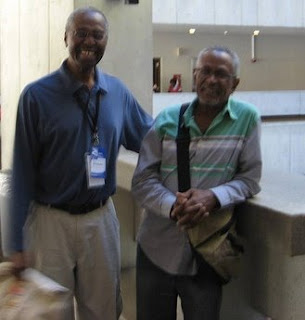
This is another year when I will attempt to do the impossible—listen to all of these writers at the
Miami Book Fair International.
I will also be introducing Sindiwe Magona (Beauty's Gift, Kwela Books), Cyril Dabydeen (Drums of My Flesh, TSAR Publications), and Dennis O'Driscoll (Stepping Stones: Interviews with Seamus Heaney, Farrar, Straus & Giroux; Reality Check: New Poems, Copper Canyon Press) at 12:30 p.m. on Saturday, November 15, 2008 in the Prometeo Theater.
You can click here to download the complete Fairgoer’s Guide:
Miami Book Fair International Guide.
Adelman, Robert: Mine Eyes Have Seen: Bearing Witness to the Civil Rights Struggle, Time Inc. Home Entertainment
Allen, Preston: All or Nothing, Akashic
Allen-Agostini, Lisa: co-editor, Trinidad Noir, Akashic
Antoni, Brian: South Beach: The Novel, Black Cat
Askowitz, Andrea: My Miserable, Lonely, Lesbian Pregnancy, Cleis Press
Atlas, James: publisher, Atlas & Co.
Baker, Phyllis: A Dreamer's Journey, Educa Vision
Banks, Russell: Dreaming Up America, Seven Stories; The Reserve, Harper
Bass, Rick: Why I Came West: A Memoir, Houghton Mifflin
Bita, Lili: Women of Fire and Blood, Somerset Hall Press
Blanco, Richard: contributor, The Portable Island: Cubans at Home in the World, Palgrave MacMillan
Bragg, Rick: The Prince of Frogtown, Knopf
Butler, Robert Olen: Intercourse: Stories, Chronicle
Campbell, Rick: Dixmont, Autumn House Press
Castro, Adrian: poet, CINTAS Foundation
Chen, Willie: contributor, Trinidad Noir, Akashic
Cisneros, Sandra: The House on Mango Street, Bloomsbury; Caramelo, Vintage
Clark, C. M.: The Blue Hour: Poems, Three Stars Press
Clarke, Austin C.: More, Thomas Allen Publishers
Corley, Linda: The Kennedy Family Album: Personal Photos of America's First Family, Running Press
Cruz, Nilo: Anna in the Tropics, Dramatist's Play Service; Two Sisters and a Piano and Other Plays, Theatre Communications Group
Dabydeen, Cyril: Drums of My Flesh, TSAR Publications
Davies, Carol Boyce: Left of Karl Marx: The Political Life of Black Columnist Claudia Jones, Duke University Press
Díaz, Junot: The Brief Wondrous Life of Oscar Wao: A Novel, Riverhead; La breve y maravillosa vida de Óscar Wao, Random House
Dufresne, John: Requiem, Mass., W. W. Norton
Flanagan, Brenda: Allah in the Islands, Peepal Tree; You Alone are Dancing, Peepal Tree
Garcia, Cristina: I Wanna Be Your Shoebox, Simon & Schuster; A Handbook To Luck, Vintage
Gassenheimer, Linda: Mix 'n' Match: Meals in Minutes for People with Diabetes, American Diabetes Association
Giovanni, Nikki: Hip Hop Speaks to Children: A Celebration of Poetry with a Beat, Sourcebooks Jabberwocky; Lincoln & Douglass: An American Friendship, Henry Holt
Grippando, James: Leapholes, American Bar Association;Last Call, Harper
Hall, James W.: Hell's Bay, Simon & Schuster
Hargitai, Peter: Millie, iUniverse
Hass, Robert: Time and Materials: Poems 1997-2005, Ecco
Johnson, Charles: Mine Eyes Have Seen: Bearing Witness to the Civil Rights Struggle, Time Inc. Home Entertainment; Middle Passage, Scribner
Lehane, Dennis: The Given Day: A Novel, William Morrow
Leonin, Mia: Unraveling the Bed, Anhinga Press
Manigat, Max: editor, Cap-Haitien Excursions dans le temps, Educa Vision
McGrath, Campbell: Seven Notebooks: Poems, Ecco
Medina, Pablo: translator, Federico Garcia Lorca's Poet in New York: A Bilingual Edition, Grove
Meeks, Brian: Paint the Town Red, Peepal Tree
Moore, Carlos: Pichón: A Memoir, Race and Revolution in Castro's Cuba, Lawrence Hill
Nunez, Elizabeth: contibutor, Trinidad Noir, Akashic
Pau-Llosa, Ricardo: Parable Hunter, Carnegie Mellon University Press
Philp, Geoffrey: Grandpa Sydney's Anancy Stories, Mabrak Books
Rushdie, Salman: The Enchantress of Florence: A Novel, Random House
Santiago, Esmeralda: El amante turco/The Turkish Lover, Alfaguara
Simon, Scott: Windy City: A Novel of Politics, Random House
Souljah, Sister: Midnight: A Gangster Love Story, Atria
Soyinka, Wole: author, Cities of Refuge Program
Standiford, Les: The Man Who Invented Christmas: How Charles Dickens's A Christmas Carol Rescued His Career & Revived Our Holiday Spirits, Crown
Strand, Mark: Blizzard of One: Poems, Knopf
Trelles, Emma: Little Spells, Goss 183
Walcott, Derek: Selected Poems, Farrar, Straus & Giroux; Omeros, Farrar, Straus & Giroux
Wish me luck & if you get a chance, drop by and see me , nuh?
***
 Twelve Poems and A Story for Christmas describes the journey of a newlywed couple, Mary and Joseph, to their ancestral homeland where they are to be registered in a census decreed by a tyrant.
Twelve Poems and A Story for Christmas describes the journey of a newlywed couple, Mary and Joseph, to their ancestral homeland where they are to be registered in a census decreed by a tyrant.


 Harriett Gilbert interviews Derek Walcott about his epic poem
Harriett Gilbert interviews Derek Walcott about his epic poem 
















